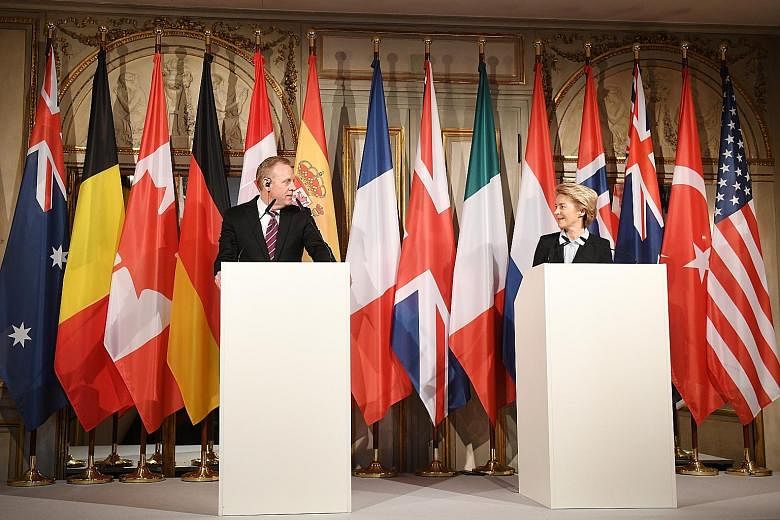MUNICH • The United States led a rise in Western defence spending last year as it moved to keep ahead of Chinese and Russian pushes into advanced military technology, a report said yesterday.
US President Donald Trump will likely press European states to spend even more at a Nato conference in April, said the International Institute for Security Studies (IISS).
European powers would together have to find an extra US$102 billion (S$138 billion) to meet his latest demands, it added.
Worldwide outlays on weapons and defence rose 1.8 per cent to more than US$1.67 trillion last year - with the US on its own responsible for almost half that increase, according to The Military Balance report released at the Munich Security Conference.
The conference, which started yesterday and ends tomorrow, is attended by more than 500 participants, some of whom are heads of state and government, or political and security heavyweights.
The annual report said Western powers were concerned about Russia's upgrades of airbases and air-defence systems in Crimea - the peninsula it seized from Ukraine in 2014. Its stationing of an S-400 air defence system there increased Moscow's reach in the Black Sea, where it seized three Ukrainian ships last year.
But "China perhaps represents even more of a challenge, as it introduces yet more advanced military systems and is engaged in a strategy to improve its forces' ability to operate at distance from the homeland", the report added.
China's stated ambition to modernise its People's Liberation Army by 2035 was "supported by defence spending that has been on a relentlessly upward trajectory".
Slower Chinese economic growth had caused a slight deceleration in spending - but the defence budget still grew nearly 6 per cent between 2017 and last year. "Chinese naval capability is entering a new phase" as it launched cruisers and began sea trials for its first indigenous aircraft carrier, the report said.
Beijing was also improving its air force and pushing into new technologies, including very-high-speed cruise missiles and artificial intelligence.
Western states "still retain an edge over adversaries, but the gap is narrowing", the report said.
"The pace of change may mean that in the future, advantages - if they exist at all - may be held only fleetingly before the other side catches up."
Mr Trump would probably keep up his pressure on Nato allies to increase their defence spending to 2 per cent of their gross domestic product, the report said.
"As of late 2018, doing this would mean that Nato European states would have to find an extra US$102 billion, on top of the amount they currently spend," it added.
Major US and European arms-makers that would benefit from any increase include Lockheed Martin, Airbus and Rheinmetall.
The IISS said that there was a serious lack of transparency regarding military expenditures in the Middle East and North Africa, where known military spending accounted for 4 per cent to 11 per cent of GDP.
No assessment was available for Syria, Libya or "particularly opaque" states such as the United Arab Emirates, it added.
Acting Pentagon chief Patrick Shanahan yesterday pledged ongoing support for the fight against the Islamic State in Iraq and Syria (ISIS) militant group after its followers are finally ousted from Syria, but kept allies guessing as to how that could be achieved once US forces pull out.
"Together, we have eliminated the group's hold over 99 per cent of the territory it once claimed as part of its so-called caliphate," he said after meeting allies in the anti-ISIS coalition.
German Defence Minister Ursula von der Leyen, who is hosting the Munich meeting, warned that ISIS had not been defeated. The anti-ISIS coalition was evolving "to meet the global threat posed by ISIS' offshoots and its murderous ideology" as far away as Afghanistan and the Philippines, she said.
REUTERS, AGENCE FRANCE-PRESSE

